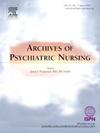正念训练对多动症儿童注意力、冲动性和情绪调节的影响:随机对照试验中家庭参与的作用
IF 2.2
4区 医学
Q1 NURSING
引用次数: 0
摘要
背景注意缺陷多动障碍(ADHD)是影响学龄儿童的最常见精神疾病之一,表现为不同程度的注意力不集中、多动和冲动。本研究采用随机对照试验(RCT)的方法,在达曼胡尔的国家医学研究所门诊部进行。研究人员使用了三种工具来收集必要的数据:研究人员使用了三种工具来收集必要的数据:工具 I,社会人口学和学术数据调查表;工具 II,范德比尔特多动症诊断家长评分表(VADPRS);工具 III,情绪调节调查表。结果正念训练干预后,研究组和对照组在注意力、冲动性和情绪调节水平上的差异具有显著统计学意义。建议:医疗保健专业人员应考虑将正念技术纳入多动症儿童的标准治疗方案中。应让家庭了解正念的益处,因为家庭参与似乎能增强这些干预措施的效果。这些计划应在学校、社区中心和治疗场所普及,以保证其普遍性。RCT:NCT06131190,日期:11-9-2023。本文章由计算机程序翻译,如有差异,请以英文原文为准。
Mindfulness-based training effect on attention, impulsivity, and emotional regulation among children with ADHD: The role of family engagement in randomized controlled trials
Background
Attention Deficit Hyperactivity Disorder (ADHD) is among the most common psychiatric conditions affecting school-aged children, marked by diverse levels of inattention, hyperactivity, and impulsivity. Mindfulness-based training intervention throughout childhood enhances those symptoms, improving emotional regulation and well-being, hence improving their quality of life.
Aim
To investigate the effects of mindfulness-based training on attention, impulsivity, and emotional regulation among children diagnosed with ADHD.
Design
A randomized controlled trial (RCT) was used to carry out this study.
Setting
This study was conducted at the outpatient Medical National Institute in Damanhur. The subjects were 60 children and their parents for the control and study groups (30 in each group).
Tools
Researchers used three tools to collect the necessary data: Tool I, A Socio-demographic and Academic Data Questionnaire; Tool II, the Vanderbilt ADHD Diagnostic Parent Rating Scale (VADPRS); and Tool III, The Emotion Regulation Questionnaire.
Results
The difference in the level of attention, impulsivity, and emotional regulation between the study and control groups after the mindfulness-based training intervention was statistically significant.
Conclusion
Mindfulness-based interventions are effective in improving inattention, impulsivity, and emotional regulation among children with ADHD and increasing their performance in all activities. Recommendations: Health care professionals should consider incorporating mindfulness-based techniques into standard treatment protocols for children with ADHD. Families should be educated about the benefits of mindfulness as family involvement appears to strengthen the effectiveness of these interventions. These programs should be accessible in schools, community centers, and therapeutic settings to guarantee general distribution.
RCT: NCT06131190, Date: 11-9-2023.
求助全文
通过发布文献求助,成功后即可免费获取论文全文。
去求助
来源期刊
CiteScore
3.70
自引率
0.00%
发文量
131
审稿时长
160 days
期刊介绍:
Archives of Psychiatric Nursing disseminates original, peer-reviewed research that is of interest to psychiatric and mental health care nurses. The field is considered in its broadest perspective, including theory, practice and research applications related to all ages, special populations, settings, and interdisciplinary collaborations in both the public and private sectors. Through critical study, expositions, and review of practice, Archives of Psychiatric Nursing is a medium for clinical scholarship to provide theoretical linkages among diverse areas of practice.

 求助内容:
求助内容: 应助结果提醒方式:
应助结果提醒方式:


